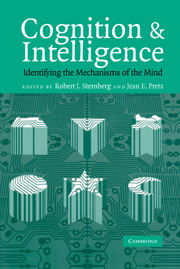Book contents
- Frontmatter
- Contents
- Preface
- 1 Information Processing and Intelligence: Where We Are and Where We Are Going
- 2 Mental Chronometry and the Unification of Differential Psychology
- 3 Reductionism versus Charting: Ways of Examining the Role of Lower-Order Cognitive Processes in Intelligence
- 4 Basic Information Processing and the Psychophysiology of Intelligence
- 5 The Neural Bases of Intelligence: A Perspective Based on Functional Neuroimaging
- 6 The Role of Working Memory in Higher-Level Cognition: Domain-Specific versus Domain-General Perspectives
- 7 Higher-Order Cognition and Intelligence
- 8 Ability Determinants of Individual Differences in Skilled Performance
- 9 Complex Problem Solving and Intelligence: Empirical Relation and Causal Direction
- 10 Intelligence as Smart Heuristics
- 11 The Role of Transferable Knowledge in Intelligence
- 12 Reasoning Abilities
- 13 Measuring Human Intelligence with Artificial Intelligence: Adaptive Item Generation
- 14 Marrying Intelligence and Cognition: A Developmental View
- 15 From Description to Explanation in Cognitive Aging
- 16 Unifying the Field: Cognition and Intelligence
- Author Index
- Subject Index
- References
14 - Marrying Intelligence and Cognition: A Developmental View
Published online by Cambridge University Press: 23 November 2009
- Frontmatter
- Contents
- Preface
- 1 Information Processing and Intelligence: Where We Are and Where We Are Going
- 2 Mental Chronometry and the Unification of Differential Psychology
- 3 Reductionism versus Charting: Ways of Examining the Role of Lower-Order Cognitive Processes in Intelligence
- 4 Basic Information Processing and the Psychophysiology of Intelligence
- 5 The Neural Bases of Intelligence: A Perspective Based on Functional Neuroimaging
- 6 The Role of Working Memory in Higher-Level Cognition: Domain-Specific versus Domain-General Perspectives
- 7 Higher-Order Cognition and Intelligence
- 8 Ability Determinants of Individual Differences in Skilled Performance
- 9 Complex Problem Solving and Intelligence: Empirical Relation and Causal Direction
- 10 Intelligence as Smart Heuristics
- 11 The Role of Transferable Knowledge in Intelligence
- 12 Reasoning Abilities
- 13 Measuring Human Intelligence with Artificial Intelligence: Adaptive Item Generation
- 14 Marrying Intelligence and Cognition: A Developmental View
- 15 From Description to Explanation in Cognitive Aging
- 16 Unifying the Field: Cognition and Intelligence
- Author Index
- Subject Index
- References
Summary
I suspect that many of the contributors to this volume are very gung ho about the progress that is being made in the many topics related to intelligence. I would also bet that most are especially optimistic about the marriage advocated by Cronbach (1957) between the two schools of psychology — with a rather cranky (some might say, musty) tradition of individual-differences research finally hitching up, around 1980 or so, with the not-so-blushing bride of cognitive psychology (who is, in fact, the daughter of the experimental psychology that Cronbach so coveted). I am not so gung ho. On a bad day I might even be clinically depressed. Much work has been done and much data have been collected, but in my view we are not much further on than we were in the middle of the last century before cognitive psychology was even thought of. Rather than a happy marriage, what I see is a sham of a relationship marked by a crushing coldness on the part of the once blushing bride (who by contrast flirts outrageously with just about every other intellectual tradition that shows an interest) and a barely restrained anger on the part of a frustrated groom. Before long I think the latter will run off with a new partner (the rather voluptuous and, for some at least, alluring neuroscience). But I see no more hope for the old fellow here. A bit of counseling is in order — maybe the hoped for relationship can be saved?
- Type
- Chapter
- Information
- Cognition and IntelligenceIdentifying the Mechanisms of the Mind, pp. 268 - 287Publisher: Cambridge University PressPrint publication year: 2004
References
- 3
- Cited by



